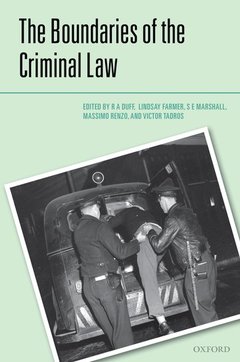The Boundaries of the Criminal Law Criminalization Series
Langue : Anglais
Coordonnateurs : Duff R.A., Farmer Lindsay, Marshall S.E., Renzo Massimo, Tadros Victor

Criminalization is a new series arising from an interdisciplinary investigation into criminalization, focussing on the principles and goals that should guide decisions about what kinds of conduct are to be criminalized, and the forms that criminalization should take. Developing a normative theory of criminalization, the six volumes will tackle the key questions at the heart of issue: By reference to what principles and goals should legislations decide what to criminalize? How should criminal wrongs be classified and differentiated? And how should law enforcement officials apply the law's specification of offences? Boundaries of the Criminal Law is the first book in this series examining the scope and boundaries of the criminal law. Investigations into the scope of the criminal law have often focused on the harm principle, the principle that conduct can be justifiably criminalized only if it is harmful, or other master principles that might determine the proper scope of the criminal law. This collection of original essays by some of the leading scholars in criminal law and philosophy from the UK and the US makes significant advances in the development of a broader range of ideas that might inform criminalization decisions. A range of issues are discussed, including the significance for criminalization of ideas of moral wrongdoing and of using a person as a means, the distinction between criminal law and other forms of legal regulation, the role of new technology in our understanding of the evolving scope of the criminal law, and the role of criminal justice officials in decision-making about criminalization. The authors draw on legal and philosophical sources, but also on history, sociology and social psychology in their investigations for a truly interdisciplinary approach. This is a groundbreaking set of essays which will help to reorient legal and philosophical discussion about the proper scope of the criminal law.
1. Introduction: The Boundaries of the Criminal Law. 2. Criminalization and the Criminal Process: Prudential Mercy as a Limit on Penal Sanctions in an Era of Mass Incarceration. 3. Preventative Orders: A Problem of Undercriminalization?. 4. Perversions and Subversions of Criminal Law. 5. Proactive Forensic Profiling: Proactive Criminalization?. 6. Horrific Crime. 7. Criminalization and Regulation. 8. Criminal Law between Public and Private Law. 9. Criminal Wrongs in Historical Perspective. 10. Theories of Criminalization and the Limits of Criminal Law: a Legal Cultural Approach.
R A Duff has taught in the Department of Philosophy, University of Stirling, since 1970. His research focuses on the philosophy of criminal law, and he has published widely on penal theory, including; Trials and Punishments (CUP, 1986) and Punishment, Communication and Community (OUP, 2001); on the structure and principles of criminal liability with titles including Intention, Agency and Criminal Liability (Blackwell, 1990), Criminal Attempts (OUP, 1996), and Answering for Crime (Hart, 2007); and on the criminal trial. His current projects include a book on The Realm of the Criminal Law. Lindsay Farmer works on the relationship between criminal law, legal theory and legal history, looking at how historical changes in the institutions and practices of the criminal law do and should shape normative accounts of criminal law. His book Criminal Law, Tradition and Legal Order (CUP, 1997) examines the development of Scots criminal law and its relation to national identity. He is currently working on a historical account of theories of criminalisation. He has been professor of law at the University of Glasgow since 1999. S.E. Marshall is a professor of philosophy at the University of Stirling. She co-edited The Trial on Trial with R.A. Duff, L. Farmer, and V. Tadros (Hart 2007), serves on the Management Committee of the Philosophical Quarterly, and is President of the UK Association for Legal and Social Philosophy. Massimo Renzo works primarily in legal theory and political philosophy. His main research interests are in the philosophical foundation of criminal law, international justice, state legitimacy, and political obligation. He is a member of the philosophy department at the University of Stirling. Victor Tadros works primarily on the philosophy of criminal law, criminal justice and punishment. He also has interests in general jurisprudence, moral and political philosophy. His book Criminal Responsibility was published by Oxford University Press in 2005. He is curren
Date de parution : 11-2010
Ouvrage de 280 p.
16.2x24.1 cm
Thème de The Boundaries of the Criminal Law :
© 2024 LAVOISIER S.A.S.



